
Since its independence in 1961, Kuwait maintained strong international relations with most countries, especially nations within the Arab world. Its vast oil reserves gives it a prominent voice in global economic forums and organizations like the OPEC. Kuwait is also a major ally of ASEAN, a regional ally of China, and a major non-NATO ally.

Ensuring national security, increasing influence among its Arab neighbours and securing the return of the Golan Heights, have been the primary goals of the Syrian Arab Republic's foreign policy. At many points in its history, Syria has seen virulent tension with its geographically cultural neighbours, such as Turkey, Israel, Iraq, and Lebanon. Syria enjoyed an improvement in relations with several of the states in its region in the 21st century, prior to the Arab Spring and the Syrian Civil War.
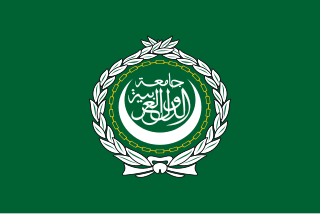
The Arab League, formally the League of Arab States, is a regional organization in the Arab world, which is located in Northern Africa, Western Africa, Eastern Africa, and Western Asia. The Arab League was formed in Cairo on 22 March 1945 initially with six members: Egypt, Iraq, Transjordan, Lebanon, Saudi Arabia, and Syria. Yemen joined as a member on 5 May 1945. Currently, the League has 22 members, but Syria's participation has been suspended since November 2011.
An exclusive mandate is a government's assertion of its legitimate authority over a certain territory, part of which another government controls with stable, de facto sovereignty. It is also known as a claim to sole representation or an exclusive authority claim. The concept was particularly important during the Cold War period when a number of states were divided on ideological grounds.
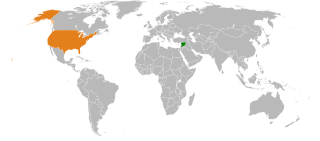
Diplomatic relations between Syria and the United States are currently non-existent; they were suspended in 2012 after the onset of the Syrian Civil War. Priority issues between the two states include the Arab–Israeli conflict, the Golan Heights annexation, and the Iraq War.

The Arab League has 22 member states. It was founded in Cairo in March 1945 with six members: the Kingdom of Egypt, Kingdom of Iraq, Lebanon, Saudi Arabia, Syrian Republic, and Transjordan. North Yemen joined on 5 May 1945. Membership increased during the second half of the 20th century. Six countries have observer status.

The foreign relations of Libya were largely reset at the end of the Libyan Civil War, with the overthrow of Muammar Gaddafi and the ongoing Second Libyan Civil War. The current Minister of Foreign Affairs in the internationally recognized executive government known as the Government of National Accord (GNA) is Mohamed Taha Siala. Although many foreign embassies in Tripoli closed down in 2014 due to the fighting, by the end of 2017 thirty diplomatic missions were reopened in the Libyan capital.

International recognition of the National Transitional Council of Libya was given by the majority of international states but was not universal.

The Syrian National Council, sometimes known as the Syrian National Transitional Council or the National Council of Syria, is a Syrian opposition coalition, based in Istanbul, Turkey, formed in August 2011 during the Syrian civil uprising against the government of Bashar al-Assad.

The European Union (EU) and the Syrian Arab Republic have signed two agreements between each other. However, due to the Syrian government's crack down on its opposition, the EU is imposing an embargo on Syria. Since 2011, the EU has supported the opposition Syrian National Council and calls for the present government to stand down. Since 2012 it has recognised the opposition as legitimate representatives of the Syrian people.

The National Coordination Committee for Democratic Change (NCC), or National Coordination Body for Democratic Change (NCB), is a Syrian bloc chaired by Hassan Abdel Azim consisting of 13 left-wing political parties and "independent political and youth activists". It has been defined by Reuters as the internal opposition's main umbrella group. The NCC initially had several Kurdish political parties as members, but all except for the Democratic Union Party left in October 2011 to join the Kurdish National Council. Some opposition activists have accused the NCC of being a "front organization" for Bashar al-Assad's government and some of its members of being ex-government insiders.

The Syrian National Council (SNC) is recognised by 7 UN members, the Republic of Kosovo and the European Union as a legitimate representative of the Syrian people in the midst of the Syrian Civil War, with three of those being permanent members of the Security Council. One country, Libya, recognises the SNC as the legitimate government of Syria.

The Syrian opposition is the political structure represented by the Syrian National Coalition and associated Syrian anti-government groups with certain territorial control as an alternative Syrian government.

The Group of Friends of the Syrian People is an international diplomatic collective of countries and bodies convening periodically on the topic of Syria outside the U.N. Security Council. The collective was created in response to a Russian and Chinese veto on a Security Council resolution condemning Syria.
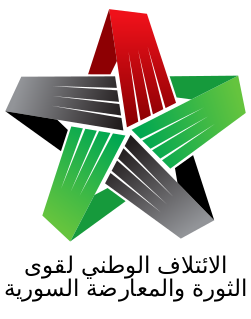
The National Coalition for Syrian Revolution and Opposition Forces, commonly named the Syrian National Coalition (SNC), or the Syrian Opposition Coalition (SOC) is a coalition of opposition groups in the Syrian Civil War that was founded in Doha, Qatar, in November 2012. Former imam of the Umayyad Mosque in Damascus, Moaz al-Khatib, considered a moderate, was elected the president of the coalition, and resigned on 21 April 2013. Riad Seif and Suheir Atassi, both prominent democracy activists and the latter a secular human rights advocate, were elected vice presidents. The post of a third vice president will remain vacant for a Kurdish figure to be elected. Mustafa Sabbagh was elected as the coalition's secretary-general. The coalition has a council of 114 seats, though not all of them are filled.
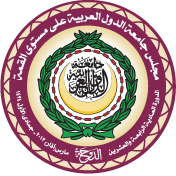
The 2013 Arab League Summit was held in Doha, Qatar from 21 to 27 March 2013.

The Syrian Interim Government is an alternative government in Syria, formed by the umbrella opposition group, the National Coalition for Syrian Revolutionary and Opposition Forces. The interim government indirectly controls some areas of the country and claims to be the sole legitimate government on behalf of the Syrian opposition in defiance of the Council of Ministers of the Syrian Arab Republic. The interim government's headquarters in Syria are located in the city of Azaz in Aleppo Governorate.

The federalization of Syria has been controversially proposed as a possible solution to end the Syrian Civil War. In the broadest sense, it means turning the centralized Syrian Arab Republic into a federal republic with autonomous subdivisions. Many powers and actors involved in the Syrian Civil War have entertained the idea of "federal division", not least among them Russia, United Nations representatives, and the United States. President Bashar al-Assad has not ruled out the possibility of a federal democratic state of Syria. Turkey is strongly hostile towards the idea of federalization in Syria because it fears possible repercussions for its own highly centralized state.
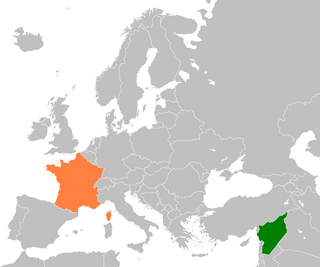
Relations between France and Syria have a long, rich historical background. Syria was a French League of Nations Mandate for two decades following the collapse of the Ottoman Empire after World War I, before the last French troops were evacuated from Syria and Syrian independence was officially recognized and diplomatic relations between France and the newly created Syrian state were established.














